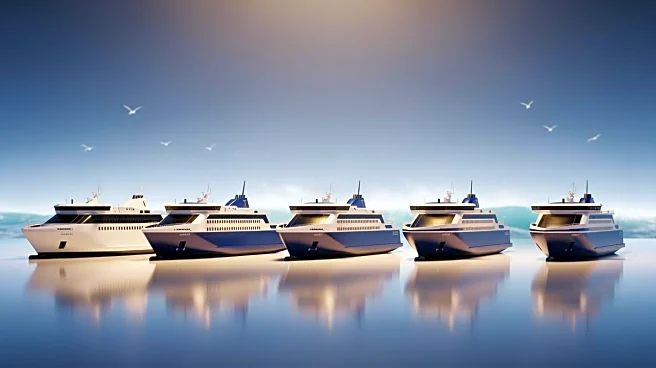What's Happening?
Italian officials are preparing to auction five Moby Lines ferries to repay debts owed to MSC, following an antitrust settlement. The auction, scheduled for November 12, will offer the vessels in a single lot starting at €229.9 million (US$264.2 million).
This move comes after MSC's acquisition of a 49% stake in Moby Lines, which raised competition concerns. The settlement requires MSC to relinquish its interest in Moby, and if the auction does not cover the debt, the remainder will be managed by a third-party organization. The auction includes vessels such as Moby Aki and Moby Wonder, which must be chartered back to Moby for 15 years.
Why It's Important?
The auction represents a significant shift in the Italian ferry market, potentially altering competitive dynamics. By separating Moby Lines from MSC, the settlement aims to preserve competition and prevent market consolidation. This decision could impact ferry operators and travelers, as Moby consolidates services and focuses on newer, efficient ships. The auction's outcome will determine Moby's financial stability and its ability to continue operations without MSC's involvement. The broader implications for the U.S. include potential changes in international ferry services and competition, affecting travel and logistics industries.
What's Next?
The auction's results will dictate Moby Lines' future financial strategy and operational focus. If successful, Moby will eliminate its debt and concentrate on modernizing its fleet. The antitrust settlement may encourage other ferry operators to reassess their market strategies, potentially leading to increased competition and innovation. Stakeholders, including travelers and competing ferry companies, will closely monitor the auction's impact on service offerings and pricing. The settlement also sets a precedent for handling antitrust concerns in the transportation sector, influencing future regulatory actions.
Beyond the Headlines
The antitrust decision marks a setback for MSC's expansion efforts, highlighting the challenges of balancing growth with competition regulations. The settlement underscores the importance of maintaining competitive markets, particularly in industries with high entry barriers. The auction's requirement for long-term charter agreements reflects efforts to ensure service continuity for passengers. This development may prompt discussions on the ethical and legal aspects of corporate acquisitions and their impact on market competition.















